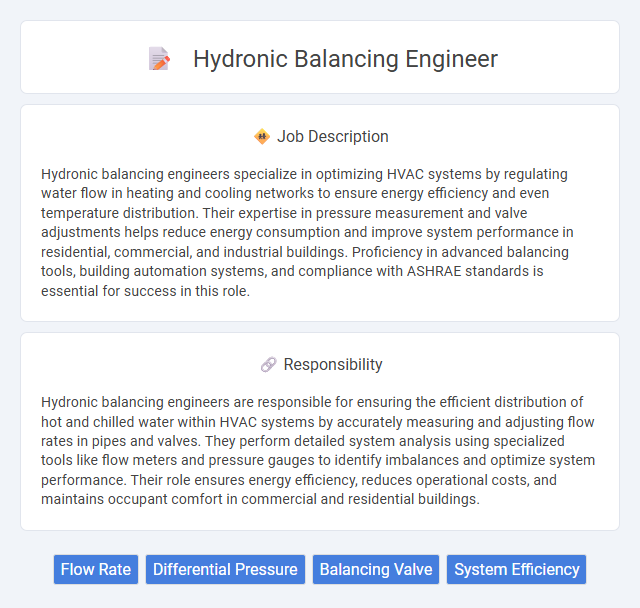
Hydronic balancing engineers specialize in optimizing HVAC systems by regulating water flow in heating and cooling networks to ensure energy efficiency and even temperature distribution. Their expertise in pressure measurement and valve adjustments helps reduce energy consumption and improve system performance in residential, commercial, and industrial buildings. Proficiency in advanced balancing tools, building automation systems, and compliance with ASHRAE standards is essential for success in this role.
Individuals with strong analytical skills and a methodical approach are more likely to excel as hydronic balancing engineers, given the job's demand for precision in HVAC system optimization. Those comfortable working with technical data and troubleshooting complex mechanical systems might find this role well-suited to their abilities. People who prefer routine tasks or lack patience for detailed measurements may find the position challenging.
Qualification
Hydronic balancing engineers typically require a strong background in mechanical engineering or HVAC systems, with certifications such as Certified Hydronic Balancing Technician (CHBT) enhancing job prospects. Proficiency in using balancing instruments, understanding fluid dynamics, and interpreting HVAC schematics is essential. Practical experience in system analysis, troubleshooting, and ensuring energy efficiency through accurate flow control is highly valued by employers.
Responsibility
Hydronic balancing engineers are responsible for ensuring the efficient distribution of hot and chilled water within HVAC systems by accurately measuring and adjusting flow rates in pipes and valves. They perform detailed system analysis using specialized tools like flow meters and pressure gauges to identify imbalances and optimize system performance. Their role ensures energy efficiency, reduces operational costs, and maintains occupant comfort in commercial and residential buildings.
Benefit
Hydronic balancing engineers likely improve energy efficiency by ensuring optimal water flow in HVAC systems, which may reduce operational costs significantly. Their expertise probably enhances system performance, leading to increased occupant comfort and prolonged equipment lifespan. This role could also contribute to sustainability goals by minimizing energy waste in building operations.
Challenge
Hydronic balancing engineers likely face the challenge of accurately analyzing and adjusting complex heating and cooling systems to ensure optimal energy efficiency and occupant comfort. The role may require advanced problem-solving skills to identify flow imbalances and implement precise control strategies within building automation systems. Success in this position probably depends on the engineer's ability to interpret data from diverse sources and collaborate with multidisciplinary teams to resolve system inefficiencies.
Career Advancement
Hydronic balancing engineers possess specialized skills in optimizing heating and cooling systems, creating opportunities for career advancement in HVAC design and energy efficiency consulting. Mastery of advanced building automation systems and energy modeling software significantly enhances prospects for senior technical roles and project management positions. Continuous certification upgrades, such as LEED or ASHRAE credentials, further enable progression into leadership roles within sustainable building engineering.
Key Terms
Flow Rate
Hydronic balancing engineers specialize in optimizing flow rate within heating, ventilation, and air conditioning (HVAC) systems to ensure efficient energy distribution and system performance. They utilize advanced tools such as flow meters and differential pressure gauges to measure and adjust water flow rates, preventing issues like uneven heating or cooling and reducing energy consumption. Precise flow rate management by these engineers enhances system lifespan and occupant comfort in residential, commercial, and industrial buildings.
Differential Pressure
A Hydronic balancing engineer specializes in optimizing the flow of water within heating and cooling systems by precisely adjusting valves to maintain optimal differential pressure across the network. Proper management of differential pressure ensures consistent temperature distribution, reduces energy consumption, and prevents system inefficiencies or equipment damage. Expertise in differential pressure measurement and control is crucial for enhancing HVAC system performance and achieving energy-efficient building operations.
Balancing Valve
A Hydronic Balancing Engineer specializes in optimizing heating, ventilation, and air conditioning (HVAC) systems by precisely adjusting balancing valves to ensure even water flow distribution across hydronic circuits. Expertise in selecting and calibrating automatic and manual balancing valves improves system efficiency, reduces energy consumption, and enhances occupant comfort. Proficiency with flow measurement tools and understanding valve characteristics are critical for maintaining optimal pressure differentials and achieving accurate hydraulic balance.
System Efficiency
Hydronic balancing engineers specialize in optimizing heating, ventilation, and air conditioning (HVAC) systems to ensure even distribution of water flow, which significantly enhances system efficiency. By precisely adjusting flow rates throughout the piping network, they reduce energy consumption, prevent equipment wear, and maintain consistent temperature control. Their expertise directly contributes to lower operational costs and improved building comfort.
 kuljobs.com
kuljobs.com